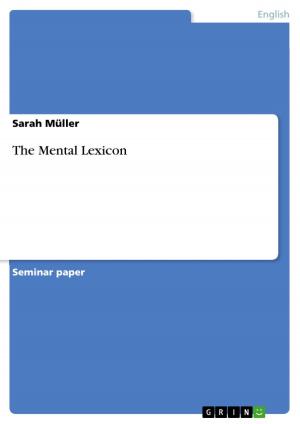Walking the Line - Girl, Interrupted on Her Way from Adolescence to Womanhood at a Borderline to a Parallel Universe
Girl, Interrupted on Her Way from Adolescence to Womanhood at a Borderline to a Parallel Universe
Nonfiction, Entertainment, Drama, Anthologies| Author: | Theresa Rass | ISBN: | 9783640492817 |
| Publisher: | GRIN Publishing | Publication: | December 14, 2009 |
| Imprint: | GRIN Publishing | Language: | English |
| Author: | Theresa Rass |
| ISBN: | 9783640492817 |
| Publisher: | GRIN Publishing |
| Publication: | December 14, 2009 |
| Imprint: | GRIN Publishing |
| Language: | English |
Seminar paper from the year 2008 in the subject American Studies - Literature, grade: 2, University of Innsbruck (Institut für Amerikastudien), course: On the Edge of Sanity: Mental Illness and Disordered Behavior in American Literature, language: English, abstract: In her autobiographical novel Girl, Interrupted Susanna Kaysen deals with the probably most difficult and influential period in her life. At the end of the 1960s, when she was eighteen, she was committed to a mental institution after a half-hearted suicide attempt and diagnosed with Borderline Personality Disorder. She spent two years at McLean, where also famous persons like Sylvia Plath, Anne Sexton, Robert Lowell and Ray Charles have been in treatment. This paper will be trying to point out the difficulties with which people, especially women, were confronted in the 1960s, when they were different in some way and how this could result in being caught in a kind of parallel universe or, even worse, being stuck in between two worlds and not knowing were they belong.
Seminar paper from the year 2008 in the subject American Studies - Literature, grade: 2, University of Innsbruck (Institut für Amerikastudien), course: On the Edge of Sanity: Mental Illness and Disordered Behavior in American Literature, language: English, abstract: In her autobiographical novel Girl, Interrupted Susanna Kaysen deals with the probably most difficult and influential period in her life. At the end of the 1960s, when she was eighteen, she was committed to a mental institution after a half-hearted suicide attempt and diagnosed with Borderline Personality Disorder. She spent two years at McLean, where also famous persons like Sylvia Plath, Anne Sexton, Robert Lowell and Ray Charles have been in treatment. This paper will be trying to point out the difficulties with which people, especially women, were confronted in the 1960s, when they were different in some way and how this could result in being caught in a kind of parallel universe or, even worse, being stuck in between two worlds and not knowing were they belong.















